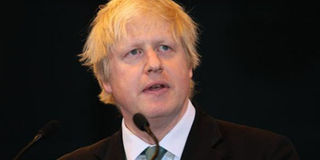Why Britain’s decision to quit the EU is a huge gamble

Former London Mayor Boris Johnson
What you need to know:
- A certain nativist strain of politics has emerged in some key countries of the West which harks on isolationism and a closed laager mentality. We see the trend in the wild politics of Donald Trump in America and the way he detests immigrants. We see it in the Brexit smoothies in the UK, led by former London Mayor Boris Johnson (pictured), who conned and frightened their countrymen that a suffocating EU bureaucracy would intrude into their way of life and regulate everything from their fish and chips to their noodles.
Britain has finally voted to get out of the European Union. Prime Minister David Cameron as a result decided to step down after leading the failed “Remain” campaign. He will stay on as a caretaker premier for three months until a new leader is elected.
A certain nativist strain of politics has emerged in some key countries of the West which harks on isolationism and a closed laager mentality. We see the trend in the wild politics of Donald Trump in America and the way he detests immigrants. We see it in the Brexit smoothies in the UK, led by former London Mayor Boris Johnson (pictured), who conned and frightened their countrymen that a suffocating EU bureaucracy would intrude into their way of life and regulate everything from their fish and chips to their noodles.
This isolationist strain comes with a disturbing bluster and is frequently not anchored on facts. It is also extremist in a dangerous sort of way. Look at the violence that often accompanies Trump rallies. In Britain, Labour MP Jo Cox, who was supporting the pro-EU campaign, was shot dead by a right-wing Brexit zealot shouting “Britain first”.
Britain has always had an ambivalent attitude toward the EU. It has long fancied itself as this exceptional island nation which does not need to be entangled with continental Europe. There is a lot of pap that was circulated that an integrating EU infringes on Britain’s sovereignty and independence—an exaggerated assertion the Brexit campaigners stretched to the limit. It is not a view shared by the United States, Britain’s closest ally. For America, it makes sense to deal with a Britain that is connected to Europe, not some isolated island with wrong notions of her importance which lacks influence with Europe. In the short term, the US is likely to take a close look at the effect Brexit will have on her economic interests, particularly with her big banks that are central to London’s place as Europe’s financial capital.
Even when part of the EU, Britain made it known it had only one foot inside. It refused to be part of the euro currency, proudly sticking to its pound sterling. It also particularly refused to have anything to do with the Schengen zone.
There is no doubt the scare about immigrants was one of the key reasons the Brexit campaign caught fire.
Supporters of the Conservative Party have always been leery about immigration, and this is one thing that has caused mighty rows inside the party, and indeed inside Britain’s body politic. The UK Independence Party, a once-upon-a-time-fringe-party that has milked the immigration issue over the years, has seen its overall prospects rise as a result.
The immigrant situation has been worsened by the situation in Syria, and by Germany’s decision to allow an unprecedented one million Middle Eastern immigrants into the country. Britain has had none of that, and a trickle of Africans and others who have camped on the French side of the English Channel hoping to cross over to the British Isles have been firmly kept out.
One direct consequence of Brexit is the very real possibility that Scotland will renew her bid to secede from Britain. The majority of Scottish voters wanted to stay in the EU, and that is how matters have been in Scotland as opposed to England where hostility to the single market bloc has been more palpable.
A referendum carried out last year on independence almost got through. With Brexit, the proponents of Scottish secession have been greatly strengthened.
Indeed the prospect is not just a remote possibility. Scotland’s First Minister Nicola Sturgeon announced immediately after the EU vote that a second referendum is “highly likely”. She described it as unacceptable that Scotland was being taken out of the EU when her own voters have largely voted to stay.
It would be a pity if Boris Johnson ended up being Cameron’s successor. He has been accused of demagoguery on a number of occasions. Yet with the way the British parliamentary system is that is entirely likely. A leadership contest will be held inside the Tory party to get Cameron’s successor, and whoever will win it will be required to complete Cameron’s term unless a snap general election is called.
Can the world contemplate a Prime Minister Boris Johnson alongside a President Donald Trump across the Atlantic? Mercifully, the latter option is looking increasingly implausible.
For more news get your copy of The Citizen read online through www.epaper.mcl.co.tz




